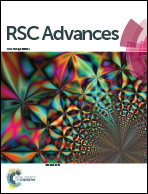Surface modification of cycloolefin polymer via surface-initiated photoiniferter-mediated polymerization for suppressing bioadhesion
Abstract
Inert cycloolefin polymers (COPs), which possess excellent optical properties, are a series of ideal materials for fabricating cheap disposable biosensor platforms. However, their antibioadhesion properties are expected to be improved prior to their application as biosensor supports. In this study, for the first time the COP supports were modified with well-controlled neutral, anionic and cationic polymer brushes via surface-initiated photoiniferter-mediated polymerization. This graft polymerization was confirmed by infrared spectroscopy, and X-ray photoelectron spectroscopy. The antibioadhesion properties of the modified supports were evaluated through a series of biological experiments. It was found that among these modified samples, the anionic poly(2-carboxyethyl acrylate)-modified COP supports presented the best antibioadhesion performances, i.e., suppressing protein adsorption, platelet adhesion and red blood cell attachment.


 Please wait while we load your content...
Please wait while we load your content...